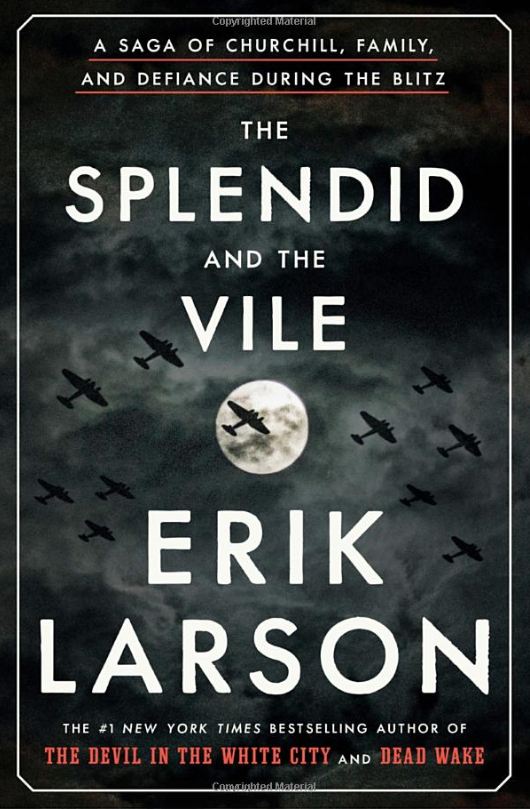Erik Larson
Crown

|
The one universal balm for the trauma of war was tea. It was the thing that helped people cope. People made tea during air raids and after air raids, and on breaks between retrieving bodies from shattered buildings. Tea bolstered the network of thirty thousand observers who watched for German aircraft over England, operating from one thousand observation posts, all stocked with tea and kettles…Tea was comfort and history; above all, it was English. As long as there was tea, there was England. from The Splendid and the Vile |
For times of trial and tribulation
A new book by Erik Larson (Isaac’s Storm, The Devil in the White City, Dead Wake) is always an occasion for celebration. But this latest book is also well-timed, about a people hunkering down amid a national crisis.
From August 1940 to June 1941, Britain stood alone against the Nazi juggernaut that had rolled over Europe in less than a year. Waves of 1000 German aircraft darkened the skies with near-daily bombings, testing the mettle, moxie, pluck and courage that has defined the British people ever since.
As in his other books, Larson captures history on the day-to-day level where it was lived. Yes, there are inspiring speeches by a bulldog prime minister, but Larson also records the more mundane matters that preoccupied people, like falling in love, or trying to, or hosting an elegant dinner party on war rations.
In his usual vivid writing (Searchlights sabered the sky) Larson reports how people carried on with remarkable grace and fortitude amid the daily tragedy and mounting losses. “Citizens brought gas masks to church and began wearing small metal identity disks on bracelets, in case they got blown into unidentifiable pieces.” Caught in the street as bombs fell around him “like hailstones,” one of Churchill’s secretaries sums up the experience in his diary as “quite a disagreeable walk.” After watching an aerial battle over Portsmouth, couples return to their game of tennis.
Over that year London was devastated, whole sections of the city reduced to ruins. Even Buckingham palace was hit, causing the Queen to remark: “I’m glad we’ve been bombed. It makes me feel I can look the East End in the face.”
But the unrelenting bombing didn’t break the people’s will. Instead, Larson finds, “What the attacks on London seemed clearly to unleash was a new sexuality.” The young didn’t want to die virgins. “A big bombing raid is a very good way to get into bed with somebody,” noted a friend of Pamela Churchill’s—though the experience didn’t always live up to expectations. One young woman wrote in her diary: “Well, that’s done, and I’m glad it’s over! If that’s really all there is to it I’d rather have a good smoke or go to the pictures.”
We are now in one of those times that try us and test us and that will show what kind of people, what kind of nation we are. We may well take lessons from the British of 1940. For a people whose history stretched back 2,000 years, it was their finest hour.
This review first appeared in The Columbia River Reader (April 15-May 15, 2020.) Reprinted with permission.



